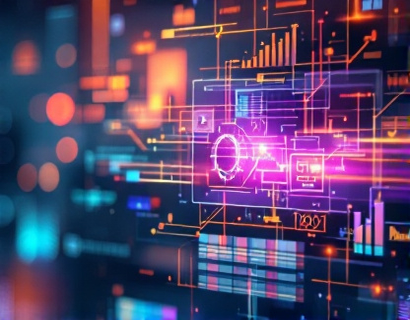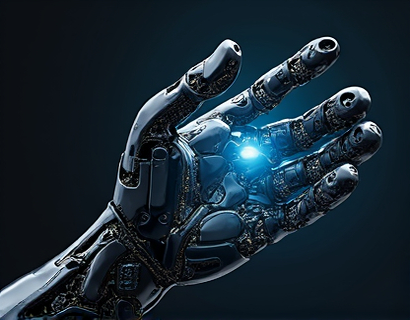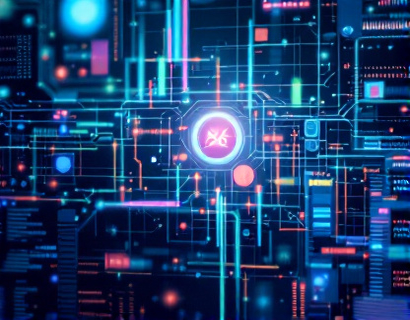Revolutionizing Digital Engagement: The Synergy of Crypto and AI
The integration of blockchain technology and artificial intelligence (AI) is ushering in a new era of digital engagement, characterized by unprecedented levels of security, personalization, and interaction. This transformative synergy is not just a technological advancement but a paradigm shift in how we interact with digital platforms and services. For tech enthusiasts and professionals, understanding the implications and potential of this convergence is crucial. This article delves into the multifaceted ways in which crypto and AI are reshaping the digital landscape, offering valuable insights for those keen on staying ahead in the rapidly evolving tech world.
The foundation of this revolution lies in the unique properties of blockchain technology. Blockchain, at its core, is a decentralized ledger that ensures transparency, immutability, and security. These attributes are invaluable in a digital environment where data breaches and fraud are persistent concerns. By leveraging blockchain, digital platforms can provide a secure and trustworthy environment for users, which is essential for building long-term engagement and trust.
Enhanced Security Through Blockchain
One of the most significant benefits of integrating blockchain into digital engagement is the enhancement of security. Traditional centralized systems are vulnerable to hacking and data manipulation, as they rely on a single point of control. In contrast, blockchain's decentralized nature distributes data across a network of nodes, making it extremely difficult for malicious actors to alter or steal information. This robust security framework is particularly important for applications handling sensitive data, such as financial transactions, identity verification, and personal information management.
For instance, in the realm of digital payments, blockchain can ensure that transactions are secure and tamper-proof. Each transaction is recorded in a block, which is then added to the chain in a cryptographic manner. This means that once a transaction is confirmed, it cannot be altered without consensus from the majority of the network. This level of security not only protects users but also builds confidence in the platform, encouraging more widespread adoption.
Personalization Driven by AI
While security is a critical aspect, the true power of combining blockchain and AI lies in the realm of personalization. AI algorithms can analyze vast amounts of data to understand user preferences, behaviors, and patterns. When this data is combined with the transparency and integrity provided by blockchain, the potential for personalized experiences becomes immense. Users can enjoy tailored content, recommendations, and services that are not only relevant but also secure and private.
For example, in the context of content streaming services, AI can curate a personalized playlist based on a user's listening history and preferences. Blockchain ensures that the data used for personalization is secure and that users have control over their data, including the ability to monetize their data preferences through tokenization. This not only enhances the user experience but also empowers users by giving them more control over their digital footprint.
Interactive and Immersive Experiences
The convergence of blockchain and AI is also revolutionizing the way users interact with digital platforms. Blockchain-based tokens and smart contracts can facilitate decentralized applications (dApps) that offer interactive and immersive experiences. These dApps can range from gaming platforms to social networks, all built on a foundation of trust and security provided by blockchain, with AI-driven features that adapt to user interactions in real-time.
Consider the gaming industry, where blockchain and AI can create dynamic and engaging environments. AI can generate procedurally unique game content, ensuring that each player's experience is different. Blockchain can manage in-game assets, such as virtual currencies and items, ensuring that they are securely owned and traded by players. Smart contracts can automate in-game transactions and rewards, reducing the need for intermediaries and enhancing the overall user experience.
Use Cases in Various Industries
The impact of blockchain and AI is not limited to entertainment. Across various industries, this synergy is driving innovation and transforming traditional processes. In healthcare, for instance, blockchain can secure patient data while AI can analyze medical records to provide personalized treatment recommendations. In finance, blockchain ensures secure and transparent transactions, while AI can detect fraud and optimize trading strategies. In supply chain management, blockchain provides traceability and transparency, while AI can predict demand and optimize logistics.
These use cases demonstrate the versatility and potential of combining blockchain and AI. Each industry can leverage these technologies to create more secure, efficient, and user-centric solutions. For tech professionals, understanding these applications is essential for developing forward-thinking solutions that meet the evolving needs of the market.
Challenges and Considerations
Despite the numerous benefits, the integration of blockchain and AI is not without challenges. One of the primary concerns is scalability. Blockchain networks, particularly those using proof-of-work consensus mechanisms, can struggle with high transaction volumes and slow processing times. However, the development of more efficient consensus algorithms and layer 2 solutions is addressing these issues, making blockchain more scalable and suitable for widespread use.
Another consideration is the regulatory landscape. As blockchain and AI technologies evolve, regulatory frameworks are still catching up. Ensuring compliance while innovating is a delicate balance that organizations must navigate. Transparency, ethical data usage, and user consent are key factors in building a regulatory-compliant and user-trustworthy platform.
Future Prospects
The future of digital engagement through the integration of blockchain and AI is promising. As technology continues to advance, we can expect even more sophisticated applications and broader adoption. The development of interoperable blockchain networks will enable seamless interactions between different platforms, fostering a more connected and cohesive digital ecosystem. AI advancements, particularly in natural language processing and machine learning, will further enhance the personalization and interactivity of digital experiences.
Moreover, the rise of decentralized finance (DeFi) and non-fungible tokens (NFTs) is opening new avenues for creative and financial empowerment. These technologies, built on blockchain and powered by AI, are redefining ownership, creativity, and economic participation in the digital world.
For tech enthusiasts and professionals, staying informed about these developments is crucial. The intersection of blockchain and AI is not just a trend but a fundamental shift in how we build and interact with digital systems. By understanding and embracing these technologies, individuals can position themselves at the forefront of the next digital revolution.










































